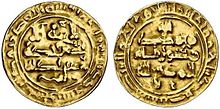al-Mutīʿ
Abū l-Qāsim al-Fadl al-Mutīʿ li-llāh ( Arabic أبو القاسم الفضل المطيع لله, DMG Abū l-Qāsim al-Faḍl al-Muṭīʿ li-llāh 'the one who obeys God'; * before 946; † autumn 974 in Dair al-ʿĀqūl) was 946–974 the twenty-third caliph of the Abbasid dynasty . He had next to no political power.
Life
Al-Mutīʿ, the son of a Slavic concubine, was a brother of the caliphs ar-Radi and al-Muttaqi . After the deposition of his enemy al-Mustakfī (r. 944-946), the Buyids enthroned him again, a son of al-Muqtadir in Baghdad . The Shiite Buyids exercised a "protective rule" over the largely disempowered Abbasids from 945 onwards. Especially when the Buyid rule under Adud ad-Daula (r. 949-983) reached its peak, there was even a threat of the abolition of the Sunni Abbasid caliphate and the establishment of a Shiite one. The relative insignificance of the caliphs at the time is supported by the fact that only four caliphs ruled Baghdad during the 100-year rule of the Buyids. Their predecessors had only been able to assert themselves on the throne for a few years.
Under al-Mutīʿ, who was initially not recognized by the Samanids , Egypt was lost to the Fatimid caliphs.
Al-Mutīʿ was also discontinued because he was seriously ill ( stroke ) (summer 974); the Buyids appointed his son at-Tā'iʿ (r. 974–991) to be his successor .
Al-Mutīʿ is the last Abbasid caliph treated by al-Masʿūdī in his universal story Kitāb at-Tanbīh wa-l-išrāf .
literature
- al-Masʿūdī : Kitāb at-Tanbīh wa-l-išrāf. Translation into French by B. Carra de Vaux. Imprimerie Nationale, Paris, 1896. pp. 506-508 ( Text Archive - Internet Archive ).
- William Muir : The Caliphate, its rise, decline and fall; from original sources. New and rev. ed., repr. Grant, Edinburgh 1924. pp. 573 f. ( Text archive - Internet Archive ).
| predecessor | Office | successor |
|---|---|---|
| al-Mustakfī | Caliph of the Abbasid 946-974 |
at-Tā'iʿ |
| personal data | |
|---|---|
| SURNAME | Mutīʿ, al- |
| ALTERNATIVE NAMES | Mutīʿ li-Llāh, al-; al-Mutīʿ li-ʾllāh al-Fadl b. al-Muqtadir; Abū ʾl-Qāsim al-Fadl ibn al-Muktadir al-Mutīʿ li-ʾllāh |
| BRIEF DESCRIPTION | 23rd Abbasid Caliph |
| DATE OF BIRTH | before 946 |
| DATE OF DEATH | 974 |
| Place of death | Dair al-ʿĀqūl |
